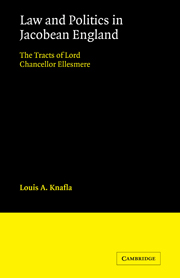Book contents
- Frontmatter
- Contents
- Preface
- List of abbreviations
- Notes on style
- Table of statutes
- Table of cases
- INTRODUCTION
- PART ONE LAW AND POLITICS
- I The Making of a Legal Mind
- II Kingship and the Problem of Sovereignty
- III Lords and Commons
- IV Reforming Privy Councillors: Crown Finances and the Administration of Government
- V The Problem of Law Reform
- VI The Clash of Jurisdictions: Central and Local Authorities, Secular and Ecclesiastical
- VII Les Enfants Terribles: Coke, Ellesmere, and the Supremacy of the Chancellor's Decree
- VIII The Provenance of Ellesmere's Tracts
- PART TWO ELLESMERE'S TRACTS
- Index of Persons and Places
- Index of Subjects and Terms
VII - Les Enfants Terribles: Coke, Ellesmere, and the Supremacy of the Chancellor's Decree
Published online by Cambridge University Press: 05 January 2012
- Frontmatter
- Contents
- Preface
- List of abbreviations
- Notes on style
- Table of statutes
- Table of cases
- INTRODUCTION
- PART ONE LAW AND POLITICS
- I The Making of a Legal Mind
- II Kingship and the Problem of Sovereignty
- III Lords and Commons
- IV Reforming Privy Councillors: Crown Finances and the Administration of Government
- V The Problem of Law Reform
- VI The Clash of Jurisdictions: Central and Local Authorities, Secular and Ecclesiastical
- VII Les Enfants Terribles: Coke, Ellesmere, and the Supremacy of the Chancellor's Decree
- VIII The Provenance of Ellesmere's Tracts
- PART TWO ELLESMERE'S TRACTS
- Index of Persons and Places
- Index of Subjects and Terms
Summary
The rise of the Chancery into a prominent court and department of state in the sixteenth century was one of the major judicial and administrative developments of the early modern period. The Chancellor came to preside over a court that had two jurisdictions: a common law and an equity side, which had their own procedures and records. The Chancellor also witnessed the growth of a maze of inner administrative departments and offices, which comprised perhaps the largest bureaucracy in the Tudor State. Conspicuous developments such as these posed awesome problems in comprehending and mastering the responsibilities of the office in the second half of the sixteenth century. And two of the first non-clerical men to preside over the Chancery, Sir Nicholas Bacon (1558–79) and Sir Thomas Egerton (from 1596–1603), were the men who approached, and began to come to grips with, these problems.
For example, both Bacon and Egerton made it a habit to issue regularly administrative directives for processing writs, keeping records, and regulating fees. They also issued numerous orders for the more efficient management of judicial procedures, tightening the rules of evidence, and controlling the form and size of pleadings. These jurists were common lawyers who conceived of equitable relief in terms of common law rules. They also conceived of courts as institutions whose jurisdiction was clearly defined. A broad programme of Chancery reform was initiated by Bacon, but his successors were not equal to the task of fulfilling it.
- Type
- Chapter
- Information
- Law and Politics in Jacobean EnglandThe Tracts of Lord Chancellor Ellesmere, pp. 155 - 181Publisher: Cambridge University PressPrint publication year: 1977
- 2
- Cited by



